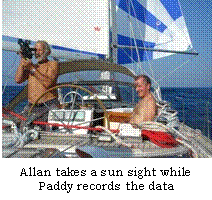Sun sights and spinnakers

|
37:36.3N
45:27.6W Paddy
Smyth contributes today’s entry... The
day’s run was 105 miles. We have a gentle 12 knots of wind from the SW and feel
that we are now correctly placed on the edge of the Today
has been glorious sailing, with the spinnaker hoisted in warm sunshine. We are
heading where we want to go, rather than zig-zagging as we did when the wind was
directly behind us. Two of
us, Allan and I, are practising some astro-navigation during the voyage. What is
the point of that you may wonder, when we have a main GPS and a backup which can
give a position to within 10 metres. The prospect of both systems failing must
be very low. Even then, we could safely press on until reaching Europe – or
Then
there’s the history – the same principle has been used for years though the
mathematics has got easier. We are using a book of ready done calculations that
was designed for quick and easy use in aircraft 70 years ago. After looking up
the details of the sun’s position at the exact moment of the fix, we can produce
an answer in five minutes. But then, think for a moment, how were those
countless calculations done all those years ago? And consider the printing
process of pages of small numbers in the days before computers.
Eventually,
when you plot the answer on the chart, you have the satisfaction of knowing that
we are truly crossing the ocean, because you have measured it yourself.
And
finally, it’s more satisfying than Sudoku, and not only because there is a point
to the deliberations but the result is actually
useful! |
 Firstly there’s the
intellectual pleasure – you need to understand how the heavens move and
visualise an enormous triangle, with the corners being the North Pole, the point
directly under the sun, and one of us with the sextant. The maths is quite easy,
simply a matter of adding and subtracting angles. The exact time is critical and
we have the benefit of a digital stopwatch set to GMT.
Firstly there’s the
intellectual pleasure – you need to understand how the heavens move and
visualise an enormous triangle, with the corners being the North Pole, the point
directly under the sun, and one of us with the sextant. The maths is quite easy,
simply a matter of adding and subtracting angles. The exact time is critical and
we have the benefit of a digital stopwatch set to GMT.